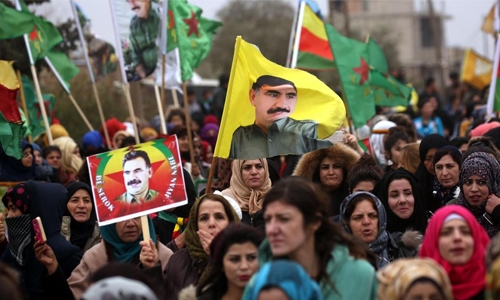Turkey has more to gain by talking to the PKK
Last month, Turkey launched Operation Claw, a large-scale air and ground assault on the Kurdistan Workers’ Party (PKK) in and around Hakurk, Iraq. This area is adjacent to the Qandil Mountains, for years the operational centre of the internationally proscribed terrorist group. The operation is part of another attempt by the Turkish state to seek a military solution to the Kurdish-Turkish conflict, which has been fought intermittently for 35 years and claimed the lives of more than 40,000 people. Operation Claw’s stated aim is to “eradicate” the terror threat emanating from the area.
If that sounds familiar, it is because it echoes that of last year’s operation, and others before it, against the PKK in the same region. The timing of both this and last year’s incursions are of note. Last year’s manoeuvre took place as Turkey was about to run parliamentary and presidential elections. This year’s operation comes just weeks ahead of the rerun of the Istanbul mayoral election, which the ruling Justice and Development Party (AKP) initially lost, cried foul and had overturned.
President Recep Tayyip Erdogan and the AKP know that exhibiting nationalist credentials by attacking the PKK is a vote-winning strategy. It also maintains their alliance with the anti-Kurdish, right-wing Nationalist Movement Party. However, there are also strategic factors at play. After the Peoples’ Protection Units (YPG), which are linked to the PKK, retook the city of Kobani and its environs from ISIS back in March 2015, the Kurds were ascendant in the northern Syrian region they call Rojava.
Around the same time, the PKK made gains in Iraq after ISIS was finally defeated at Sinjar, where the Yazidi people were massacred, displaced and enslaved. But, before then, Turkey was in dialogue with the PKK and a ceasefire was in place. The 2014 siege of Kobani changed all of that. Many Kurds in Turkey could see the city and its surrounding villages from their side of the border. They were enraged that Ankara initially prevented Kurdish forces from crossing to help save them from imminent slaughter. After the tide began to turn in the YPG’s favour, the PKK felt emboldened and started to make new demands. The nascent peace process and ceasefire buckled under the pressure.
Activists in some Kurdish towns in Turkey sought to assert regional control, erecting barricades and digging trenches to prevent Turkish security forces from entering. Throughout 2015 and 2016, Turkey stepped up its military campaign against the Kurds in the south-east. There were hundreds of civilian deaths and mass displacement among the Kurdish population. Accordingly, PKK-affiliated groups resumed deadly attacks across Turkey.
To make matters worse for Ankara, the Democratic Union Party – the YPG’s political wing – declared federal democratic autonomy in Rojava in March 2016, following further gains both east and west of the Euphrates. The possibility of a 1,000km stretch of contiguous Kurdish autonomy, from the mountainous Iraqi-Iranian border to the environs of the Mediterranean Sea in Syria is just too much for Ankara to bear. It threatens Turkey’s regional dominance and would reduce the nation’s influence over the Kurdistan Regional Government (KRG) in Iraq. It would also weaken Ankara’s hand against the PKK and embolden Kurdish separatism inside Turkey.
This is why Turkey continually intervenes across its borders. In Syria, it launched two large-scale operations between 2016 and 2018, designed to capture YPG positions to the east of the Euphrates. In neighbouring Iraq, it frequently targets PKK infrastructure and reacted harshly to the KRG holding a referendum in favour of independence in 2017, virtually closing off the autonomous region from the outside world. However, Ankara’s attempt to solve the Kurdish question by military means lacks vision.
Instead, Turkey could reap the strategic benefits of pursuing dialogue with the PKK. Turkey faces the threat of a resurgent ISIS, which launched a deadly wave of terrorist attacks inside its borders between 2013 and 2017. The nation is also facing the fact that, with Russian support, Bashar Al Assad is winning in Syria and looks set to stay. He will not be quick to forget Turkey’s hostility. However, these serious threats could be mitigated if, as a stepping stone for increased dialogue, Ankara renews the ceasefire with the PKK.
This could lead to quiet along the border. If peaceful talks make progress, Turkish companies may even have the opportunity to win contracts and tenders for infrastructural and development projects inside the Kurdish regions of Syria. Turkey would also have a buffer to both Assad’s forces and ISIS. What is more, it would place Turkey on the same page as the US, Ankara’s estranged Nato ally and a principal backer of the YPG. Turkey’s recent decision to allow the imprisoned PKK leader Abdullah Ocalan access to his lawyers could be a start.
The next stage would be to release members of the liberal and Kurdish-oriented Peoples’ Democratic Party, many of whom have been imprisoned on trumped up terrorism-related charges. Instead of seeking a military solution, Turkey should restart talks with the Kurds. Dialogue offers it more in the long-term than any military option.
Related Posts

